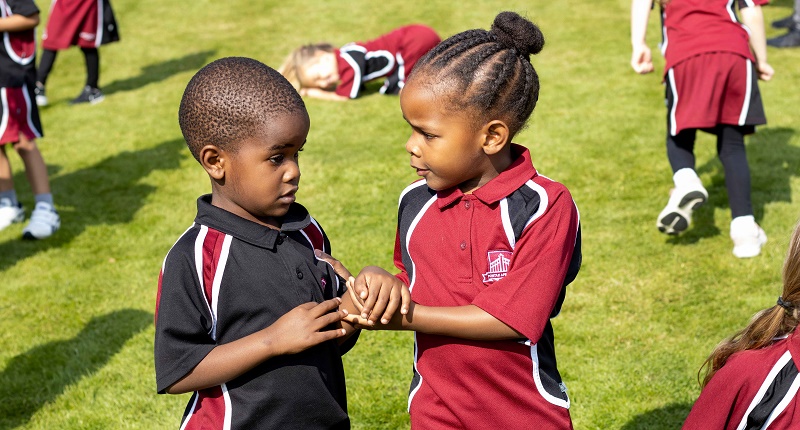


Find out how Gateways could provide the perfect educational environment for your child.
Find out more
Big enough to challenge, small enough to care

There are many different benefits to spending time surrounded by nature and with the increased amount of time children are spending online and looking at screens, finding ways to encourage time outdoors is even more important to experience the benefits.
These are some of the top reasons that nature is key in children’s development:
Nature boosts mental health
Since the start of the COVID-19 pandemic, studies show that children’s depression and anxiety may have doubled. Being outside provides children with a greater sense of freedom and from a scientific perspective, it lowers the levels of the stress hormone, cortisol. For children to develop to their full potential, spending more time outdoors will lower stress and anxiety, enabling them to focus on learning better.
Promotes social interactivity
Moving outside from a classroom or from restricted indoor space encourages children to play together and work together. Instead of being sat with the same people, going outdoors gives the option to be around people they would not normally be sat near, which helps them to develop a wider social network.
More vitamin D
Spending time outdoors gives children more exposure to sunlight, which means they absorb more vitamin D, bringing a number of key health benefits. Vitamin D is important for physical development as it keeps bones, teeth and muscles healthy. Some research also show that vitamin D can boost memory, which is crucial for learning.
Nature can restore attention
If children are having trouble concentrating in a classroom, for example, if they have mental fatigue, spending some time outdoors can help restore their attention.
Encourages good physical health
When children spend more time outdoors, they are more likely to be active, doing activities such as running, walking and climbing. Spending time outdoors on a regular basis when they are younger can help children to develop a lifelong enjoyment of spending time outdoors and being active.
At Gateways, we encourage pupils to spend more time outdoors through a number of ways, from our engaging outdoor learning environments to our comprehensive timetable of extra-curricular activities. Our investment in outdoor facilities such as the outdoor classroom, athletics tracks, tennis courts and sports fields also enable our pupils to spend more time outdoors in PE lessons, as well as for extra-curricular sports activities. We have separate outdoor play areas in The Gatehouse Nursery and Littlegates for our Early Years children and when the weather permits we sometimes take certain Prep and High School lessons outdoors making the most of our outdoor space.
With summer holidays not too far away, it is a great time to start planning ways to spend more time outdoors and less time online. You could plan family bike rides, picnics at the beach or get some new sports equipment to play outdoors.
Encouraging children to sit outside to read a book or help with the gardening are all great ways to increase the amount of time spent outdoors. Find hobbies that your child enjoys that they can do outside rather than in the house, such as drawing, painting and crafts to help them to get that extra vitamin D and all the other great benefits.
Here’s some suggestions of how to get your children into nature:
Bird Watching – Top tip: make a home bird feeder to bring the birds to you! Try and find what birds live in your local area whilst observing their colours, behaviours and feathers (binoculars help!)
Natural Art – Leaves, petals and sticks all make the perfect art tools, see what you can make with nature! Try making a face with whatever nature has to offer!
Treasure/insect hunt – Nature is home to many insects and treasures. Challenge your little ones to find different insects and objects. Set them the task to find the following: worms, ladybird, beetle, ant, acorn, pinecone, colourful leaves, conkers. For a more challenging find, be less specific and see what they can find, try finding something shiny, something that could hold water or something of a particular colour.
Picnics – Get amongst nature whilst having a picnic! You may even be able to forage for some additions to your picnic, especially around berry season (being careful of the thorns). If you have any leftover berries, try baking with them. To get even more within nature, why don’t you try building a good old-fashioned den to sit in!
Get planting! – Planting a seed and watching it grow is an accomplishment that your child will never forget, try planting lots of different seeds including vegetables, flowers and fruits this Summer and track the progress! Top tip: tomatoes and basil are quick growing plants to yield quick results.
Weave with nature – Using sticks, leaves and twine, spend the time to weave them together to create your own piece of art!
Use technology to learn – Encourage your child to utilise technology by taking pictures of all the interesting things they can find in nature. You could even download a plant identification app to help them differentiate between plant species!
To find more news, events & blogs by Gateways School here